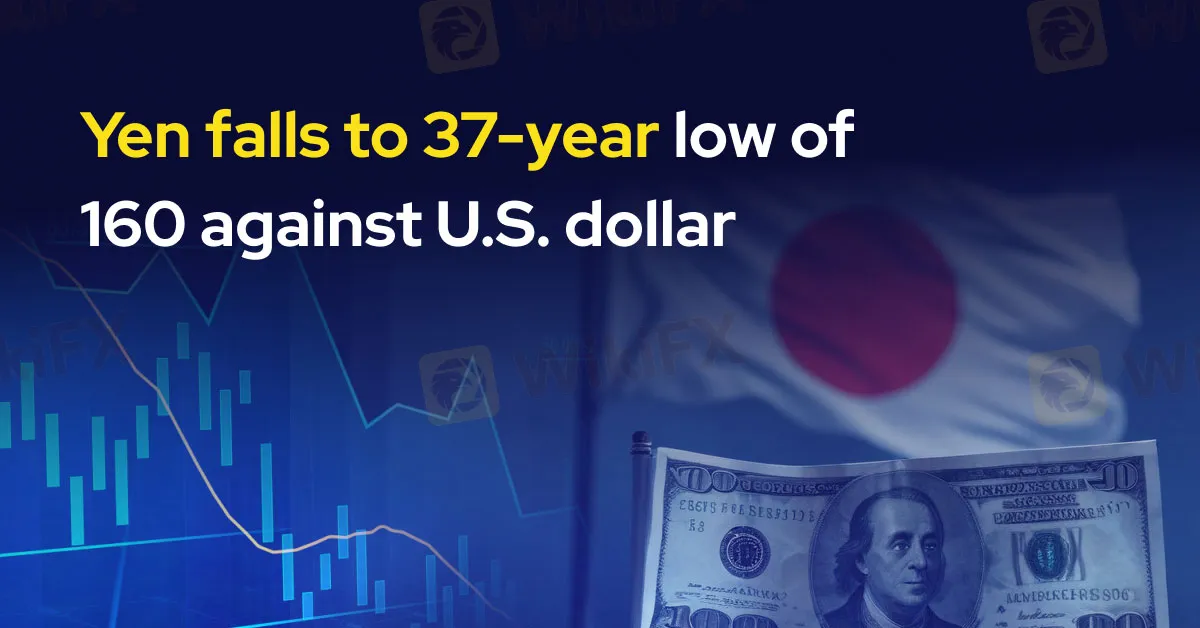简体中文
繁體中文
English
Pусский
日本語
ภาษาไทย
Tiếng Việt
Bahasa Indonesia
Español
हिन्दी
Filippiiniläinen
Français
Deutsch
Português
Türkçe
한국어
العربية
Yen falls to 37-year low of 160 against the U.S. dollar
Abstract:The Japanese yen plummeted below 160 against the US dollar on Wednesday, marking its weakest position in over 37 years. The steep decline has sent shockwaves through Tokyo, prompting urgent discussions on intervention strategies to stabilize the currency.

The Japanese yen plummeted below 160 against the US dollar on Wednesday, marking its weakest position in over 37 years. The steep decline has sent shockwaves through Tokyo, prompting urgent discussions on intervention strategies to stabilize the currency.
The yen's descent below the critical 160 threshold occurred amidst heightened concerns raised by Japanese and South Korean economic forecasters earlier this week. The situation escalated further after the United States added Japan to its watch list for currency manipulation, intensifying global scrutiny.
During London trading hours, the yen touched 160.39 against the dollar, a level unseen since 1986. The alarming drop triggered swift action from Japan's central bank on April 29, when the yen first breached the 160 mark, prompting immediate intervention measures.
Masato Kanda, Japan's vice finance minister, conveyed deep apprehension over the yen's rapid depreciation, emphasizing the government's vigilant monitoring of market trends and readiness to implement necessary countermeasures. “We have a serious concern about the recent rapid weakening of the yen,” Kanda stated, underscoring the urgency of the situation in remarks reported by Bloomberg.
The Japanese government has already committed substantial resources to curb the yen's freefall, spending approximately $61.3 billion in interventions between April 26 and May 29. These efforts involved selling treasuries to stabilize the currency amidst volatile market conditions.
Earlier attempts to bolster the yen, such as the Bank of Japan's first interest rate hike in 17 years in March, have not yielded the desired results. Despite these measures, the yen has continued to struggle against the strengthening US dollar, posing significant challenges for Japan's economic stability and global trade competitiveness.
As Tokyo deliberates on its next steps to address the currency's unprecedented decline, global markets remain attentive to developments that could impact broader economic landscapes. The yen's trajectory in the coming days will likely influence policy decisions in Japan and reverberate across international financial markets, underscoring the interconnected nature of global economies amidst evolving geopolitical dynamics.

Disclaimer:
The views in this article only represent the author's personal views, and do not constitute investment advice on this platform. This platform does not guarantee the accuracy, completeness and timeliness of the information in the article, and will not be liable for any loss caused by the use of or reliance on the information in the article.
Read more

Never Heard of Dynasty Trade? Here's Why You Should Be Worried
Have you heard this name before? No , it’s time you do because staying unaware could cost you. This platform is currently active in the forex trading and has been linked to several suspicious activities. Even if you’ve never dealt with it directly, there’s a chance it could reach out to you through ads, calls, messages, or social media. That’s why it’s important to know the red flags in advance.

WEEKLY SCAM BROKERS LIST IS OUT! Check it now
If you missed this week's fraud brokers list and are finding it difficult to track them one by one — don’t worry! We’ve brought together all the scam brokers you need to avoid, all in one place. Check this list now to stay alert and protect yourself from fraudulent brokers.

Catch the Latest Update on BotBro & Lavish Chaudhary
BotBro, an AI-based trading platform, became popular in India in 2024—but for negative reasons. Its founder, Lavish Chaudhary, who gained a huge following by promoting it heavily on social media. Since then, he has become well-known, but for many controversies. Let’s know the latest update about Botbro & Lavish Chaudhary.

Trading Other People’s Money | What Prop Firms Don’t Tell You
Proprietary (prop) trading firms have become increasingly popular. They give traders the chance to trade with larger amounts of money without risking their own savings. For many, this sounds like the perfect opportunity to grow faster and earn more. But while the benefits are appealing, there are also risks and hidden rules that traders must understand before joining a prop firm.
WikiFX Broker
Latest News
Global week ahead: Crunch time for trade talks as Trump's deadline nears
Top Wall Street analysts recommend these dividend stocks for regular income
Stock futures rise as U.S.-EU trade deal kicks off a hectic week for markets: Live updates
Samsung Electronics signs $16.5 billion chip-supply contract; shares rise
Does XS.com Hold Leading Forex Regulatory Licenses?
EU chief to meet Trump in Scotland in push to avoid a transatlantic trade war
Trump's trade deals and tariffs are on the chopping block in court. What happens next
AI is radically changing entry-level jobs, but not eliminating them
CNBC Daily Open: A week when everything happens
Samsung Electronics signs $16.5 billion chip-supply contract in boost to foundry business; shares rise
Currency Calculator


